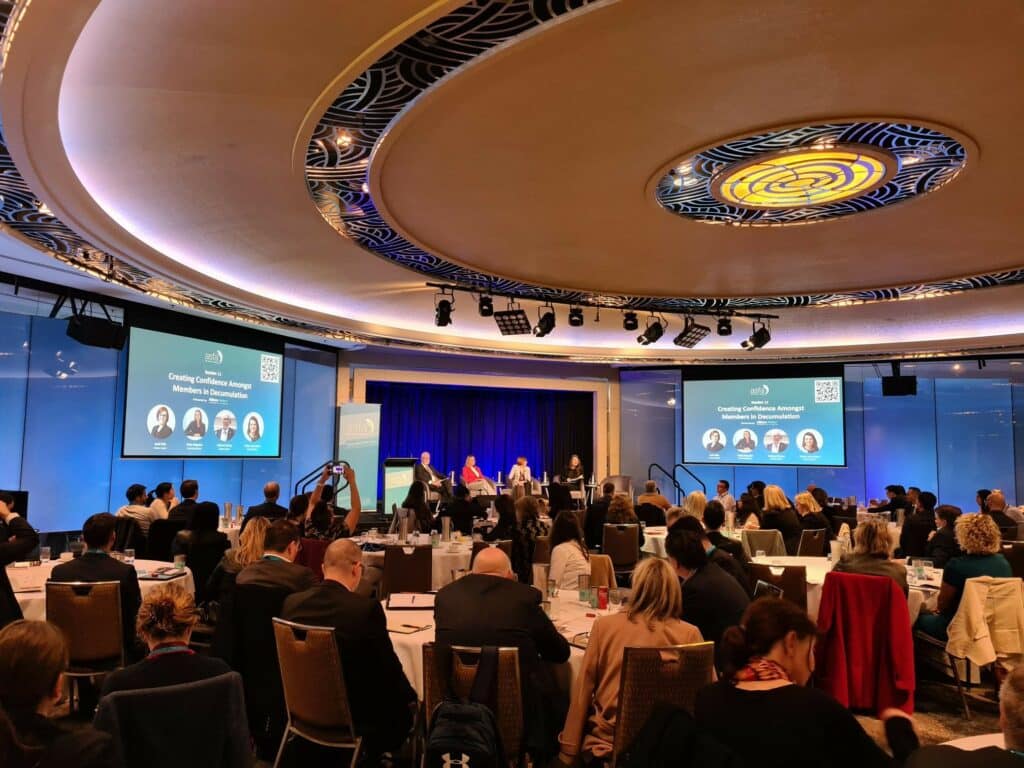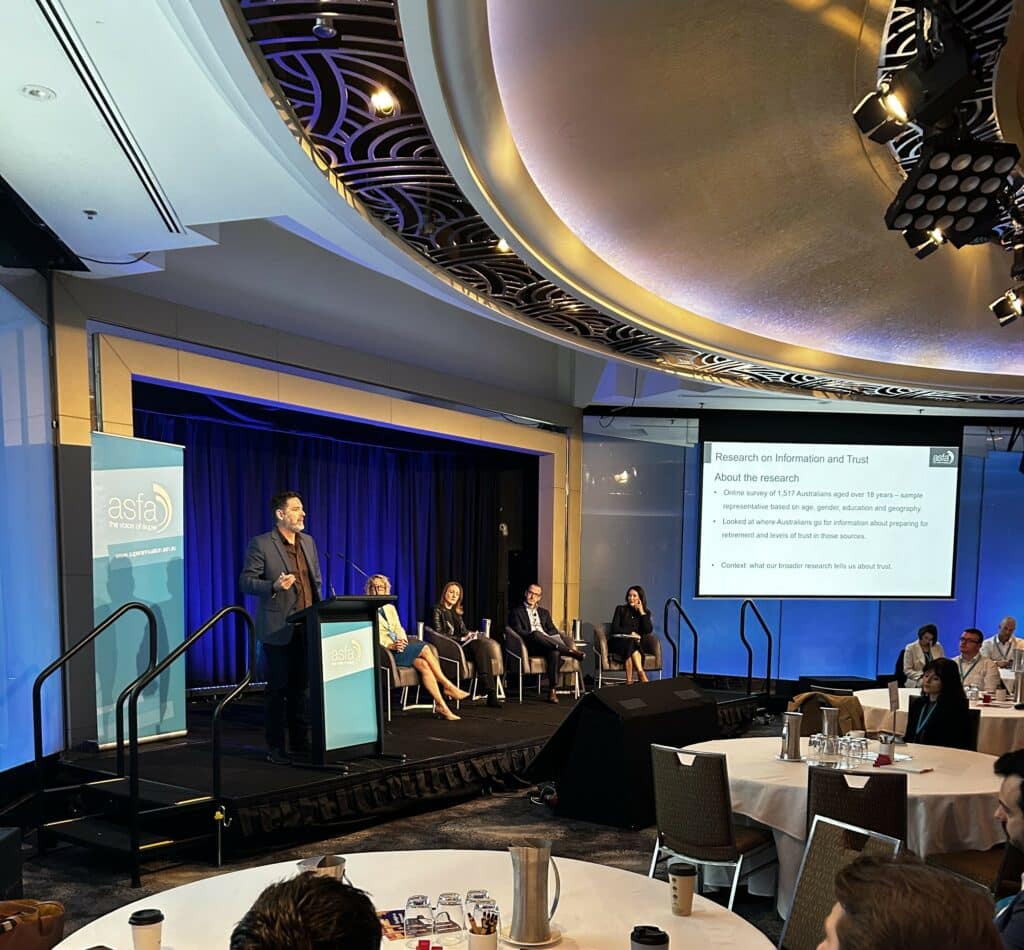You cannot ignore the retirement research
In the first session ‘Research Round Up’, chaired by ASFA CEO Mary Delahunty, the panel discussed recent research into the Australian outlook on retirement. Simon Welsch from RedBridge Group said the superannuation industry doesn’t have a trust gap, but the challenge is to close the connection gap. Angela Hartl from Mercer suggested a scorecard to measure the effect of Retirement Income Strategies and Renae Smith from Vanguard Australia shared the results of a Vanguard survey of 18,000 working age Australians and warned that only 40% had a clear plan for retirement with one in five of working age believing they are at significant risk of running out of money in retirement. Shaun Bransdon from TAL noted that members’ top concerns are: declining physical health, reduced mobility, needing long-term healthcare, cognitive decline and super running out or not having enough money.
In Session 2 the eminent Sharan Burrow AC, Former General Secretary of the International Trade Union Confederation, and Prof. Marian Baird AO, Professor of Gender and Employment Relations, Co-Director of the Sydney Employment Relations Research Group, University of Sydney Business School, reminded everyone that the origins of superannuation were based on a historical notion of what was required in retirement and that we still are nowhere near adequacy for the overall system today. Women’s retirement income is still an issue, and the LISTO is pathetically low and needs a lift. Also, it was noted that the Age Pension system is too rigid and some cohorts—including women and low-income earners—need to work into their 70s.
Hearing from the Regulators
Session 3A was an opportunity for delegates to hear directly from the regulators. ASIC’s Jane Eccleston, Senior Executive Leader – Superannuation & Life Insurance, made a case for funds collecting more data and making use of dashboards in better retirement product design and delivery. She argued that challenges should not be a bar to progress. Both Jane and Peter Kohlhagen, General Manager, Superannuation at APRA, referred to the recent survey of funds regarding the implementation of the retirement covenant. They saw this as evidence of a lack of urgency and a long way to go, with only one in five planned improvements likely to be completed in the near future. Jane particularly, argued that small changes are not good enough, with the bar shifting (upwards) all the time.
The superannuation lawyers shared their perspectives
Following on the conversation, in Session 3B superannuation lawyers Zein El Hassan Partner, Mills Oakley; Ruth Stringer Partner, Minter Ellison; Luke Barrett Partner, Gilbert + Tobin and Chair Nicolette Rubinsztein pointed to improvements to the regulatory environment and an argument for reviewing the SIS Act, which is 30 years old and arguably no longer fit for purpose. Regarding digital advice, Tranche 2 advice reforms were acknowledged as an opportunity to bring greater clarity.
Consider younger members from the start
Session 4 shifted to the topic of younger members where Anne Fuchs from Australian Retirement Trust, Deborah Potts from Rest Super, Marianne Walker from Cbus Super, and Frontier Advisors’ Wayne Sullivan articulated the need to set young members up well in the first place so they can consider the important aspects necessary for achieving a better retirement outcome.
To reach younger members, all the research points to the need to be where they are – such as meeting them in their socials and chosen communication channels. However, there is nervousness and conservatism around this due to advice legislation.

Talking about data and AI
In Session 5, Giacomo Tarantolo from UniSuper, Michelle Lusty from Bravura Solutions, and Chair Luke Symons discussed the role of data and AI. UniSuper aspires to be the Netflix of Retirement with hyper-personalised retirement options and data will be pivotal to achieving this because clearly, one size does not fit all. Members can look the same on paper but when considered holistically, and include information held outside the fund, members can have very different overall positions.
So, funds need to think about how they can use data to improve their advice strategies with it noted that 60% of the cost of advice comes from finding out about members’ financial position. Luke urged the industry to be passionate about open data as it will provide a more holistic understanding of members’ financial needs.
Putting retirement risks under the microscope
In the next session the two Irishmen, Darragh Monaghan and John Walters from Hannover Re advised everyone that the increase in the Australian population is not stemming from a very fertile Australian population (as our fertility rate is considered low at 1.77%) but is driven by overseas immigration which is expected to continue. On a brighter note, Australia’s compulsory default system is being copied globally and there is a supreme level of comfort locally with default in the pre-retirement stage. But in the post-retirement stage, default is taboo despite retirees exhibiting “default behaviours”.
The role of Aged Care in retirement
In session seven, Patricia Sparrow, from COTA Australia, Tom Symondson from Aged & Community Care Providers Association (ACCPA) and Sam Harris from HESTA looked at the evolving role of aged care for an ageing population with Prime Super’s Maria Ganakas as Chair.
There are 1.3 million people in care at any one point in time which includes home-based and residential care, and that number is expected to double over the next 20 years. However, Aged Care is usually only accessed at a time of crisis and for a short period, mostly at the end of life so it’s important not to conflate retirement with Aged Care.
The call to action is for funds to have difficult conversations with members about their plans for retirement and to include care, but it’s also important to understand that members’ plans will change as they age, and the services offered need to support members in that journey.
The ASFA Retirement Standard – 20 Years On
Ross Clare, architect of the ASFA Retirement Standard, unpacked the origins and uses of the ASFA Retirement Standard from when it was first introduced in 2004, formulated on the basis of a research report that originally included a large refrigerator that was deemed ‘largesse’ by the media and was removed sometime later! Many changes have been made through the years with budgets for over 85 and over introduced in 2015, and digital streaming now included instead of CDs! They say imitation is the best flattery and equivalent budgets have been published in New Zealand, the UK, and Hong Kong and the use of the ASFA Retirement Standard continues to grow.
Designing inclusive experiences for older members
Pleasingly in session 9, it was revealed that innovative solutions are being designed to support older members. Today’s older members are a diverse group with ever-changing needs as they age, and they include newer cohorts such as those who speak English as a second and even third or fourth language. The panel comprising Chair Jenny Nguyen from TAL and speakers Jennifer McSpadden from Brighter Super and AustralianSuper‘s Kate Leplaw agreed that the industry needs to think about how to engage older members in a way that intelligently taps into their emotions. It was suggested that we may need to look to supermodel Naomi Campbell (who doesn’t like the word ‘retire’) for the best way to think about the experiences faced by our older members!

Exploring whether advice has become a whole new ballgame
Next in session 10, Aware Super’s Peter Hogg, Sarah Abood from Financial Advice Association Australia (FAAA), Csaba Baranyai from Industry Fund Services (IFS) and Chair Lachlan Allardice from SS&C Technologies focused on how the QAR reforms impacted the whole industry and profession, as the reforms are no longer restricted to superannuation funds as the remit has been broadened with the aim of increasing the supply of advice and making advice cheaper to access. This has introduced a new class of advice, although the industry is still waiting on the details and unsure about how it is going to work and how to integrate any changes into existing structures. The panel discussed the real opportunity for the industry to work through the challenges to make it work for members.
Finding ways to create confidence among members in decumulation
In the final session of the day Michael Clancy from Qantas Super, Vicky Maguire from AustralianSuper, Aware Super’s Jacki Ellis joined Chair Lucy Foster from Allianz Retire+ discussed how to measure members’ level of confidence and ascertain what success looks like.
The retirement research shows that males tend to be more confident than females, younger members are more confident than older members but perhaps surprisingly, members are most confident when they are in retirement assumingly because they are no longer facing into the unknown.
Member feedback shows that they expect their fund to invest their money wisely and look after it. They also want to be communicated with and kept engaged on an ongoing basis and they want superannuation and retirement to be simplified.
The speakers agreed that the industry complicates super/retirement for members with jargon and it needs to consider introducing simple terms that members can understand. Members are not interested in or understand ‘products’ – they are interested in the outcomes those products can deliver!
What’s next on the agenda
After the program delegates convened for informal drinks and there seemed to be much to discuss and unpack.
ASFA’s Commercial Director, Justine Earl-Smith said she’d received overwhelmingly positive feedback from delegates at the end of the day.
“This year’s Spotlight on Retirement event definitely struck the right chords in terms of topics around retirement issues and concerns most impacting the industry. Many of the sessions sparked some interesting conversations afterward, and we will consider these when planning upcoming events, as well as next year’s Spotlight on Retirement.
“Some of these topics will also be raised and expanded on during the ASFA Conference in November, and we look forward to seeing many of the delegates there, as well as those who missed out attending today.”
The ASFA Conference is being held on 19-21 November in Sydney. For further information, visit the website here.



































